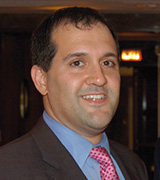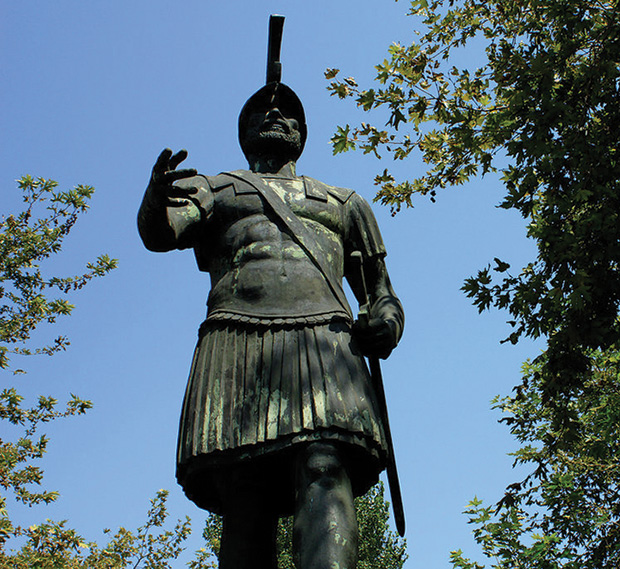Our Themistocles Moment

Endy Zemenides
Early in 2014, the sequel to the movie The 300 – 300: Rise of an Empire – will be released. It will tell the story of legendary Athenian commander Themistocles, and the historic naval battles of Artemisium and Salamis. The movie promises to be as cartoonish as the original one was, but it presents a teaching moment that we must not lose.
It is certainly time that the Battle of Salamis is celebrated in popular culture to this degree. The 300 Spartans, Thermopylae, and the Battle of Marathon have long captured popular imagination, but Salamis was both more pivotal to the survival of Greece and the West and directly led to the Golden Age of Athens – which in many ways provided the cultural underpinnings of the West.
Beyond the significance of the battle, we should not miss the opportunity to celebrate the example of Themistocles. A quick Google search doesn’t produce a list on which Themistocles ranks as one of the great leaders in world history, but he may in fact be the very definition of leadership.
One of the top commanders at the Battle of Marathon, Themistocles resisted the urge to over celebrate or overlearn from the lesson of defeating the Persians for the first time, and instead had the prescience to realize that the next Persian invasion would be a far more daunting challenge. He urged the Athenians to build triremes – the large wooden ships that ancient Greece is now famous for. This was a significant – and expensive — change of direction for the polis, and the debate over it found itself at the heart of the struggle for leadership of Athens between Themistocles and Aristides. Themistocles ultimately prevailed, and Aristides was ostracized.
Another element of leadership that Themistocles is not celebrated enough for is learning from setback or defeat. It is fitting that the new movie begins with a focus on Artemisium, not only because its link to the battle of Thermopylae, but because Themistocles commanded naval forces there, and clearly adjusted strategy after facing Persian forces there. Although we are living in a day and age where even the slightest victory establishes a new gospel, the value of lessons learned from setback should not be undervalued.
Governing terrain and choosing battlefields have defined many of history’s greatest military commanders. This was certainly the case during the Persian Wars. The valor of Leonidas and his 300 was made possible by the favorable terrain at Thermopylae. Themistocles similarly gave the Greek fleet a huge advantage by choosing the Bay of Salamis – a move that some (including the Persians) interpreted as a suicidal last stand. Yet Themistocles chose this battlefield because it neutralized Persian advantages (a bigger fleet with faster, more maneuverable ships) and made his ships (heavier with ramming ability) more valuable.
The same Google search on great leaders does not really provide insight into another trait that is probably the last step in the emergence of a true leader – timely deference. Leaders are defined by their star power and being in the forefront, yet stepping back at the right moment is as important as stepping up. The best examples of this can be found in sports. Michael Jordan was always great, but he was an MVP and world champion not in the year he hit “The Shot” against the Cleveland Cavaliers, but in the years where he fed John Paxson for open shot after open shot against the Lakers, when he passed up a shot so Paxson could hit a game winner against the Phoenix Suns, and passed to Steve Kerr for a championship clincher against the Utah Jazz. To succeed at Salamis, Themistocles simultaneously set aside ego, believed in himself, and acknowledged what was necessary by bringing back his exiled rival Aristides and deferring official control of the Greek fleet to the Spartan commander.
A few paragraphs cannot do justice to the story of Themistocles, and neither will the movie. Herodotus is a great resource for those who wish to learn more, but for a quick enjoyable read, try Persian Fire by Tom Holland or The Battle of Salamis by Barry Strauss. This is a learning moment that we cannot miss. Our community and all its causes – from ethnic issues, to religious freedom, to efforts to preserve the language and heritage – find themselves at a critical moment. We often invoke the example of Thermopylae and the 300 to drive our efforts, but it is to Salamis and Themistocles that we should be pointing. We need to build institutions with a sense of strategy, vision, and that are not driven by personality, the way that the victorious Greek fleet and battle strategy were developed. 2014 may represent our own Themistocles moment – are we ready to build the ships?












0 comments